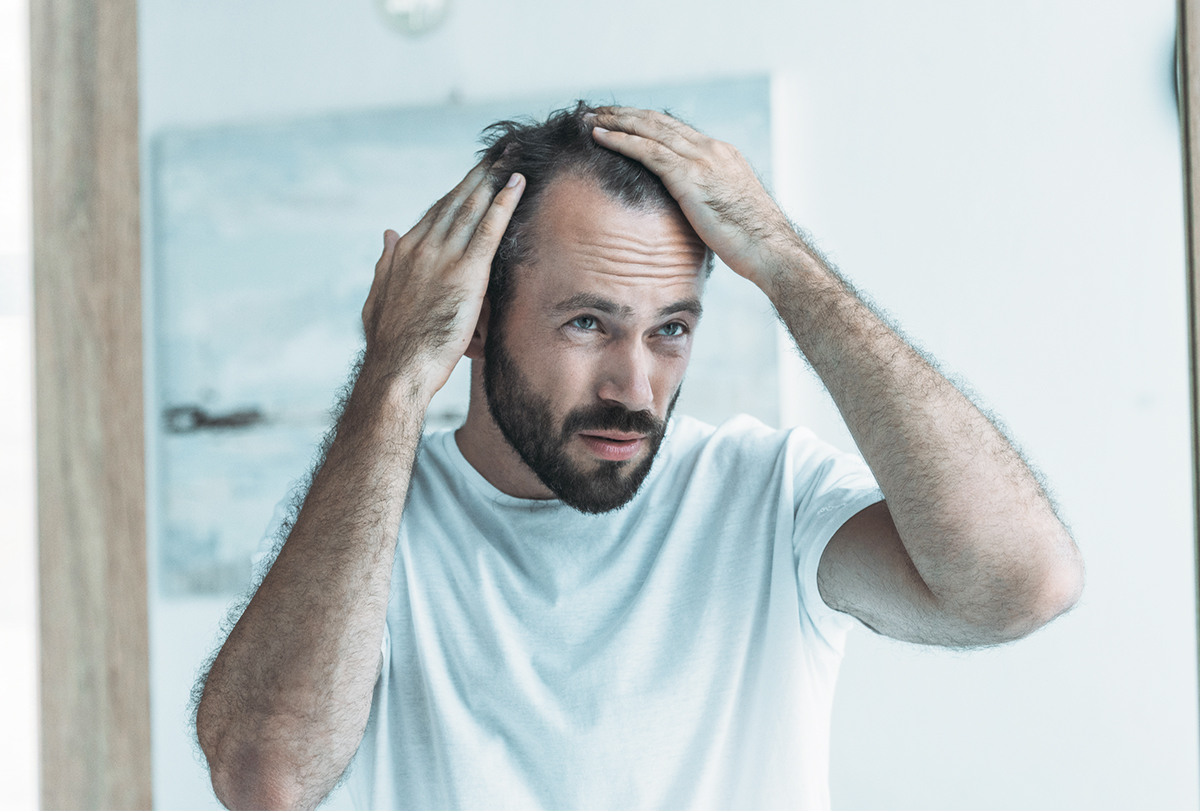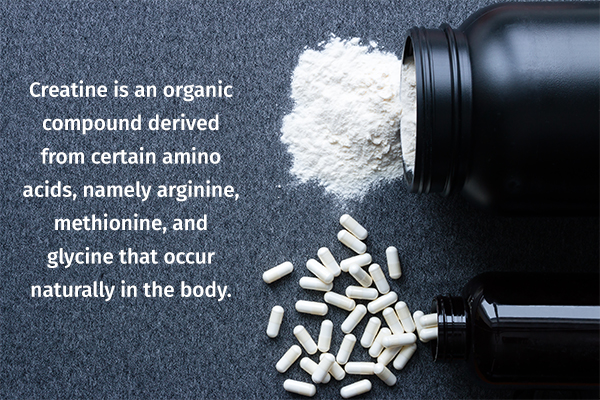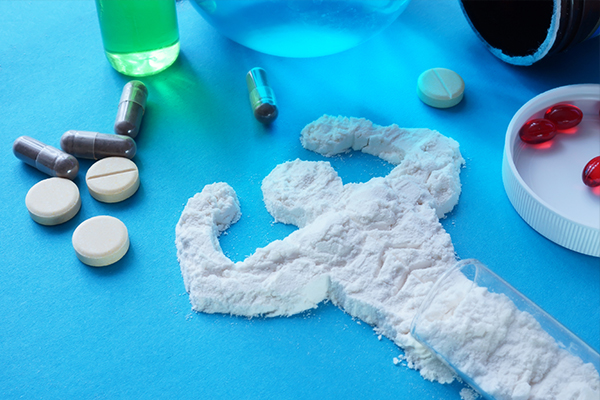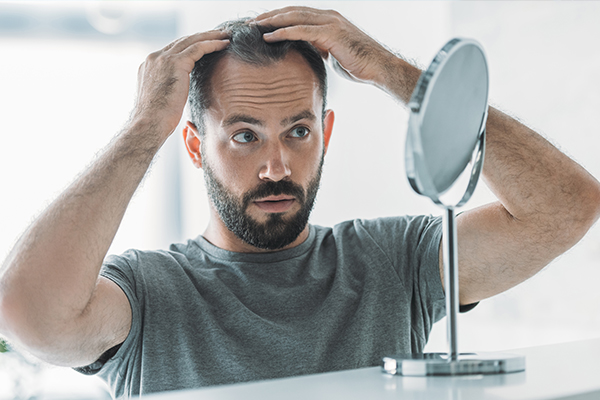In this article:
Creatine supplements are often used by athletes and bodybuilders for creatine’s ability to enhance the strength, structure, and function of muscles.

This compound has quite a few other benefits too. Not only does creatine power your muscles, it is also credited with cardiovascular, neuroprotective, and dermatological benefits.
However, some studies from the previous decade suggested that excessive creatine in the body may trigger hair loss, which has prompted many to reconsider increasing its intake through diet and supplements.
This article looks into the evidence linking creatine with hair loss to verify whether this claim is true or false.
What Is Creatine?

Creatine is an organic compound derived from the amino acids arginine, methionine, and glycine, which occur naturally in the body. It is credited with multiple benefits, but its prime function is to energize, build, and repair the muscles.
The body is capable of producing creatine on its own but not enough to meet its daily needs. So, you have to get the remaining fill through dietary sources, particularly meat products that are loaded with protein or amino acids.
You can also get artificially produced creatine in the form of supplement powders and capsules, which is quite the rage among athletes and bodybuilders.
Meat and fish eaters generally obtain about 1 g of creatine from their diet and 1 g is produced within their body daily. This creatine is later broken down to creatinine, which is a waste product that is filtered out by the kidneys and eliminated through urine. (1)
Within the body, creatine is produced by the liver and kidneys, and 95% of it goes to the skeletal muscles for storage and the remaining 5% to the brain, heart, and pancreas. This compound is converted into phosphocreatine or creatine phosphate after entering the muscle cells by the action of an enzyme complex called creatine kinase.
Creatine phosphate holds high amounts of energy, which is used to facilitate muscle contractions, build lean muscle mass, and improve athletic performance. Creatine supplementation increases the phosphocreatine stores in the muscles and has been shown to enhance performance during high-intensity, short-duration activities or repeated bouts of high-intensity exercise with short rest periods such as jumping, sprinting, and strength training. (2)
Meanwhile, the creatine found in the brain (3) helps protect against neurological disorders and trauma. (4)(5) This nutritional compound is also known to reduce inflammation and mental fatigue. (6)
The Available Forms of Creatine
Many types of creatine supplements sold on the market, but the most popular choice for athletes and trainees is creatine monohydrate, which is safe to consume in small doses. (7)
Other available forms include creatine ethyl ester, creatine hydrochloride, creatine magnesium chelate, liquid creatine, and buffered creatine.
Note: Creatine supplementation may trigger adverse side effects in some people, including cramping, nausea, fluid retention, and diarrhea.
Genetics, DHT, and Hair Loss

Each hair strand is rooted in a hair follicle, which is a small tunnel-like structure embedded inside the outermost layer of the skin (the epidermis). The bottom of the hair follicle contains the hair bulb, within which protein cells divide to form the hair shaft.
The shaft then goes through three phases of growth:
- Anagen – the active growth phase, wherein the hair grows to its full length
- Catagen – the transitional phase, which marks the end of hair growth and shrinking of the hair follicle
- Telogen – the most long-lasting phase, wherein the hair follicle becomes totally inactive and the hair remains the same size for months until it finally falls out
Both environmental and biological factors can affect the working of the hair follicle to promote or inhibit this hair growth cycle, but this article will only focus on the changes that occur inside the body.
Testosterone is a male sex hormone (androgen) that is found in both men and women. This hormone is converted into dihydrotestosterone (DHT) by an enzyme called 5-alpha reductase (5-AR). This conversion mostly takes place in peripheral tissues such as the skin, prostate, and hair follicles, where DHT exerts its maximum effect.
DHT is much stronger than testosterone and is needed for the development of some male characteristics during puberty, including facial and body hair growth, but excessive amounts can trigger male-pattern baldness. (8)
You may wonder how the same hormone can induce hair growth and baldness at the same time, but the fact is that DHT interacts differently with the hair follicles present in different parts of the body. It stimulates the ones found on your chest, face, and pubic area, but shrinks the ones found on your scalp.
Here’s how. The DHT produced in the scalp tissue attaches itself to the androgen receptors within the hair follicles and builds up over time.
When there is an overproduction of testosterone in the body, more of it will be transformed into DHT, resulting in abnormally high DHT levels. But the degree to which DHT will collect inside the hair follicle largely rests on the number of receptors it contains and how sensitive they are to the concerned androgen. The more sensitive the androgen receptors, the more DHT will bind to it. (9)
This receptor sensitivity in turn depends on certain genetic factors. (10) For instance, the presence of genes, such as the EDA2R gene, and variation in others, such as the AR gene, can make you more susceptible to androgenetic alopecia. (11)
Moreover, the overcrowding of the hair follicle with DHT blocks the supply of blood to the hair bulb. Thus, the hair cells don’t get enough oxygen and nutrients to multiply and build the hair shaft, resulting in a shorter anagen phase (active hair growth phase).
Your hair not only becomes thin, dull, and brittle but also fails to grow in length. The lack of nourishment makes your hair follicle shrink in size and prematurely shed its hair. Once the hair falls out, the follicle may take an abnormally long time to grow a new strand or disappear completely.
This kind of hair loss is known as androgenic alopecia and is mostly observed along the hairline, namely, the temples, crown, and front of the forehead.
Androgenetic alopecia is more common among men because they have higher levels of testosterone than women. Moreover, this condition may have slightly different manifestations in both genders, which is why it is classified into male androgenetic alopecia and female androgenetic alopecia.
ALSO READ: Does DHT Cause Hair Loss and Ways to Manage It
How Does Creatine Affect the Hair Loss Process?

Studies have demonstrated that taking creatine supplements can alter the ratio of dihydrotestosterone (DHT) and testosterone.
In one study, (12) 20 male rugby players were put on a daily dose of 25 g creatine supplements for 1 week, which was increased to 5 g/day during the next weeks.
For 21 days, the testosterone levels of the participants remained the same and no hair loss or hair thinning was reported, but their DHT levels increased by 56% after 7 days and remained 40% above the normal levels after 14 days of creatine supplementation compared to the placebo group.
This led to the conclusion that creatine supplementation does not increase testosterone production in the body but promotes its conversion to DHT.
As discussed earlier, high DHT levels are known to trigger hair thinning in both men and women. So, this study suggested that creatine supplementation can potentially induce hair loss by increasing DHT concentrations in the body.
Final Word
The above-mentioned study is subject to limitations, including poor sample size, lack of corroborating studies, and the fact that the sensitivity of a hair follicle to the circulating DHT varies from person to person, which makes some people more vulnerable to alopecia than others.
Also, no research has established a direct link between creatine intake and hair loss. Thus, more studies are needed to verify the claim that creatine causes hair loss. The existing evidence is not conclusive enough to disprove the safety of creatine supplements with regard to hair health.
- Was this article helpful?
- YES, THANKS!NOT REALLY


